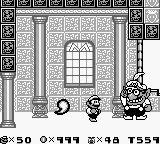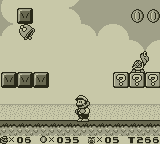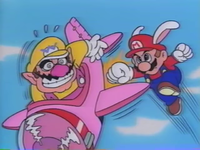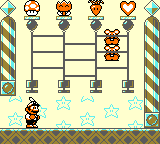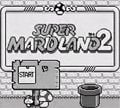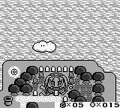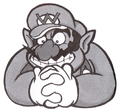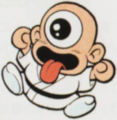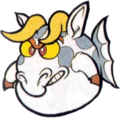Super Mario Land 2: 6 Golden Coins: Difference between revisions
m (Reverted edits by 49.239.64.182 (talk) to last revision by Doc von Schmeltwick) Tag: Rollback |
m (Added the South Korean age rating.) |
||
| Line 8: | Line 8: | ||
|genre=2D [[Genre#Platform|Platformer]] | |genre=2D [[Genre#Platform|Platformer]] | ||
|modes=1 player | |modes=1 player | ||
|ratings={{ratings|esrb=E|cero=A|pegi=3|acb=G|usk=0|rars=0+}} | |ratings={{ratings|esrb=E|cero=A|pegi=3|acb=G|usk=0|rars=0+|grac=all}} | ||
|platforms=[[Game Boy]], [[Virtual Console]] ([[Nintendo 3DS]]), [[Game Boy - Nintendo Switch Online]] | |platforms=[[Game Boy]], [[Virtual Console]] ([[Nintendo 3DS]]), [[Game Boy - Nintendo Switch Online]] | ||
|format={{format|gb=1|3dsdl=1|switchdl=1}} | |format={{format|gb=1|3dsdl=1|switchdl=1}} | ||
Revision as of 05:31, August 9, 2024
| Super Mario Land 2: 6 Golden Coins | |||||||||||||||
|---|---|---|---|---|---|---|---|---|---|---|---|---|---|---|---|
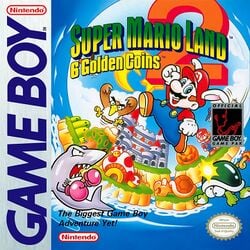 American box art For alternate box art, see the game's gallery. | |||||||||||||||
| Developer | Nintendo R&D 1 | ||||||||||||||
| Publisher | Nintendo | ||||||||||||||
| Platform(s) | Game Boy, Virtual Console (Nintendo 3DS), Game Boy - Nintendo Switch Online | ||||||||||||||
| Release date | Game Boy: Template:Release Virtual Console (3DS): Template:Release Game Boy - Nintendo Switch Online: Template:Release | ||||||||||||||
| Language(s) | English (United States) Japanese | ||||||||||||||
| Genre | 2D Platformer | ||||||||||||||
| Rating(s) |
| ||||||||||||||
| Mode(s) | 1 player | ||||||||||||||
| Format | Nintendo Switch: Game Boy:
Nintendo 3DS: | ||||||||||||||
| Input | Nintendo Switch: Game Boy:
Nintendo 3DS:
| ||||||||||||||
| Serial code(s) | Template:Serials | ||||||||||||||
Super Mario Land 2: 6 Golden Coins, also known as simply Super Mario Land 2 or Mario Land 2, is a platforming game for the Game Boy released in 1992 and later for the Nintendo 3DS's Virtual Console in 2011 and the Nintendo Switch's Game Boy - Nintendo Switch Online service as one of its launch titles in 2023. The Virtual Console release requires 44 blocks (5.6 MB) of memory to be installed. This sequel to Super Mario Land is the seventh entry in the Super Mario series[1] and also marks the debut of Mario's self-proclaimed arch rival Wario, who would later become a recurring character in the Super Mario franchise as well as a protagonist in his own series. Like its predecessor, it received a Player's Choice and was produced by the late Gunpei Yokoi rather than the Super Mario franchise creator Shigeru Miyamoto, who was not involved in the development of this game. It is notable for having been the last original side-scrolling Super Mario game until 2006's New Super Mario Bros., 13½ years later (not counting reissues). Like Super Mario Land, this game was originally excluded from the main Super Mario series by Nintendo,[citation needed] but went on to be included alongside the more traditional games for the 30th anniversary of Super Mario Bros.[2] and the history pages from the Mario Portal and "The official home for Mario" websites.[3][4]
Story
Story from the instruction booklet[5]
DANGER! DANGER!
While I was away crusading against the mystery alien Tatanga in Sarasa Land, an evil creep took over my castle and put the people of Mario Land under his control with a magic spell. The intruder goes by the name of Wario. He has been jealous of my popularity ever since we were boys, and has tried to steal my castle many times. It seems he has succeeded this time. Wario has scattered the 6 Golden Coins from my castle all over Mario Land. These Golden Coins are guarded by those under Wario's spell. Without these coins, we can't get into the castle to deal with Wario. We must collect the 6 coins, attack Wario in the castle, and save everybody!
IT'S TIME TO SET OUT ON OUR MISSION!!
★The 6 Golden Coins are the coins needed to open the gate of Mario's castle.
After rescuing Princess Daisy from Tatanga in Sarasaland, Mario returns to his own private island, appropriately named Mario Land. Upon returning, however, he finds that an old rival of his named Wario had succeeded in taking over his castle and cast an evil spell to brainwash the island's inhabitants into serving him against Mario. The 6 Golden Coins (the keys to Mario's castle) were spread throughout the island, and Mario must retrieve these coins so that he can confront Wario in order to reclaim his castle and restore order to Mario Land.
The game begins with a simple "tutorial" level, Mushroom Zone, to help the player learn the controls of the game. This level can not be replayed. After this is completed, the player must travel through six different "zones" containing a series of levels to collect the coins:
- The Tree Zone: A large tree infested with giant insects, this zone is guarded by the Big Bird.
- The Turtle Zone: Inside of a giant tortoise, this zone is an aquatic environment and is guarded by an octopus located inside of a whale.
- The Macro Zone: A house-like zone that shrinks those who enter it, this zone is guarded by the sewer rat.
- The Pumpkin Zone: Located inside a giant jack-o'-lantern containing graveyards and haunted houses, this zone is guarded by the Witch.
- The Mario Zone: A mechanical version of Mario, this zone is guarded by the Three Little Pigs.
- The Space Zone: Encompassing the moon and stars, this zone is guarded by the alien Tatanga, the final boss of the original Super Mario Land.
- In addition to the tutorial level, there is also another level that is not part of any specific "zone" or area, and lies off the path between the Tree Zone and the Macro Zone. Playing this level does not unlock anything, though does count as one of the exits in the game. Unlike the tutorial level, this level can be replayed.
After gathering the 6 Golden Coins, Mario can venture into a dangerous, transformed version of his old castle. Upon reaching the throne room, Mario finally confronts Wario and they duke it out. Though Wario was bigger and stronger, Mario was able to best him with his wits and superior jumping skills. Wario then begins using the same powerups as Mario used during his journey, such as a Carrot to give him hovering abilities and a Fire Flower to give him the power to throw fireballs. Despite these power-ups, however, Mario was still able to defeat him in battle. As a result, Wario shrinks and begins crying in defeat, but then throws one of his shoes at Mario before making his escape from the castle, with Mario following suit. With Wario gone, the castle returns to normal and peace is restored to Mario Land.
Gameplay
Overview
Unlike the gameplay of its predecessor, Super Mario Land 2's gameplay more closely resembles that of past Super Mario franchise titles. Most notably, this game replaces the Superball Mario with a more traditional Fire Mario and does away with the vehicle levels of Super Mario Land. The screen can now scroll to the left, allowing Mario to backtrack through levels, and character sprites have significantly increased in size, enabling more focused and fast-paced action as well as a better overall visual quality to the game. The game is one of the first Super Mario games to have two different difficulty levels: Normal and Easy mode. The level can be chosen by picking Mario's size with the button before picking which file to save to.
Like in Super Mario World, the game's locations can be traversed via an overworld map. This gives rise to a few secrets, including "shortcuts," which allow Mario to traverse the map more quickly, and a casino where Mario can gamble his coins to earn more lives. The worlds do not have to be played linearly without requiring a hidden item or exit, although all of them have to be completed eventually. The player can return to the world map from a completed level by pressing to pause and then
.
Controls
In levels, the allows Mario to jump, while holding the
will make Mario run faster. Holding up on the
will make Mario jump a little higher. The
controls where Mario walks or runs. The player can pause in a level with the
button. Jumping on most enemies will defeat them, as will attacking them with fireballs, a Star, or hitting them with a Koopa Shell. A Koopa Shell can be picked up by running into it while holding
and thrown by letting go, or it can be kicked by walking into it or jumping on top of it.
Super Mario Land 2 continues a tradition established by past games and includes a plethora of level designs. For example, there are water levels through which Mario swims by tapping (Mario can also swim through sap, and movements such as walking and falling are slowed down) and space levels with altered gravity (jump height is increased, as is fall time).
Mario can use Warp Pipes in the same manner as in other games: by holding down on the while standing on top of one, up while jumping up into one above, or left or right for pipes that are horizontal.
Game Boy
: Jump; swim
: Run; throw fireball (as Fire Mario)
: Move
: Pause
Nintendo 3DS
: Jump; swim
: Run; throw fireball (as Fire Mario)
/
: Move
: Pause
Rewards and setbacks
Getting hit by an enemy or hazard while Mario is in his Small state, falling to the bottom of the screen or in lava, getting crushed behind the screen in an auto-scrolling level, or running out of time, makes Mario lose a life and get booted out of the level and back to the map. If Mario loses all of his lives, he will also lose all of the six coins he has collected and will have to fight their guardians once again, but he does not have to replay the other levels in their worlds to get there. Extra lives are represented as hearts as opposed to green mushrooms in this game, due to the grayscale graphics.
Each level has a checkpoint, which is a bell hanging from a block. If Mario rings the bell, he starts the level from this location should he lose a life.
The exits of regular levels are marked "GOAL" and consist of a door in the wall and a bell hanging from a post above it. If Mario enters the door, the level immediately ends, and he returns to the map and progresses to the next stage marker, but if he hits the bell first, he gets to play a bonus game which can reward him with power-ups or more lives.
Collecting 100 coins does not immediately reward Mario with an extra life like it does in other titles, but it does allow the player to enter the casino in the hill between Mario's castle and the tutorial level for a chance to earn lives. Mario can hold up to 999 coins.
There is no "score" in the traditional sense that Mario gets in this game for defeating enemies or completing the level with extra time, but he does have an enemy counter for each enemy he defeats, and defeating 100 enemies will cause a Star to fall down to Mario.
Worlds
As the game's title suggests, the game is split into six different worlds, and then a final level where Mario fights Wario, the final boss.
| World | Coin | Boss | Levels | |
|---|---|---|---|---|
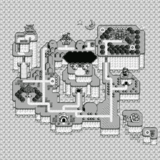 Overworld courses |
N/A | N/A |
| |
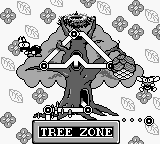 Tree Zone |

|
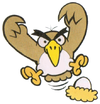 Big Bird |
| |
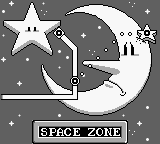 Space Zone |

|
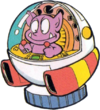 Tatanga |
| |
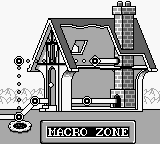 Macro Zone |

|
 Sewer rat |
| |
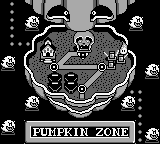 Pumpkin Zone |

|
 Witch |
| |
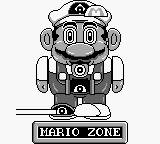 Mario Zone |

|
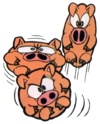 Three Little Pigs |
| |
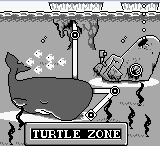 Turtle Zone |

|
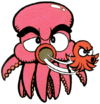 Octopus |
| |
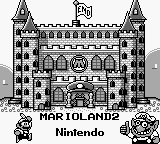 Mario's castle |
N/A |  Wario |
|
Characters
| Image | Name | Description |
|---|---|---|
| Mario | The game's protagonist and the only playable character. While Mario was in Sarasaland, his longtime rival Wario took over his castle in Mario Land. Unlike the game's predecessor, Mario looks comparable to his appearance in Super Mario World and controls similarly. In the Space Zone, he wears an astronaut suit over his overalls. | |
| Heavy Zeds | Sleepy owls. One stirs when Mario steps on its head and carries him to distant area. Heavy Zeds only occur in the Tree Zone. |
Enemies and obstacles
Enemies
Sorting the "level" columns organizes them by occurrence in-game, not alphabetically.
| Image | Name | Description | Levels | New | |
|---|---|---|---|---|---|
| First | Last | ||||
| Goomba | Walks forward aimlessly, can be defeated with one stomp. | Mushroom Zone | Cheep Cheep Course | — | |
| Para-Goomba | Hops around in a small area, having their wings removed with one stomp. | Mushroom Zone | Whale Course | — | |
| Masked Ghoul | Walks forward aimlessly like a Goomba, but propels Mario upwards when stomped. | Bat Course | Witch's Mansion Course | Template:Chart icon | |
| Aqua Goomba | Moves like a Goomba and propels Mario high into the air when stomped. | Whale Course | Template:Chart icon | ||
| Koopa Troopa | Can be knocked into its shell, which can be kicked to hurt other enemies. | Mushroom Zone | Secret Course 6 | — | |
| Piranha Plant | Periodically emerges from pipes to bite Mario. | Mushroom Zone | Secret Course 6 | — | |
| Venus Fire Trap | Periodically emerges from pipes, and shoots a fireball. | The Exit | Pumpkin Zone Level 3 | — | |
| Ragumo | Burrows underground to pop up and damage Mario. | Invincibility! | Template:Chart icon | ||
| Bopping Toady | Hops a small distance before lashing out its tongue for a short-ranged attack. | Invincibility! | Template:Chart icon | ||
| Spikey | A hedgehog that curls up into a ball and dashes at Mario. | Invincibility! | Template:Chart icon | ||
| Kyotonbo | Flies in quick, darting motions to home in on Mario. | Invincibility! | Template:Chart icon | ||
| Moofish | Swims in sap, and charges at Mario horizontally if he gets close. | In the Trees | Template:Chart icon | ||
| Noko Bombette | Patrols an area, and explodes after being stomped. | In the Trees | Template:Chart icon | ||
| Ant | Marches back and forth in a small area, damaging Mario if touched. | The Exit | In the Syrup Sea | Template:Chart icon | |
| Chikunto | Has retractable spikes that can damage Mario if he tries to jump on it. | The Ant Monsters | Template:Chart icon | ||
| Dokanto | An ant with cannons on their heads that periodically fire pellets. | The Ant Monsters | Template:Chart icon | ||
| Goronto | Digs up rocks and rolls them towards Mario. | The Ant Monsters | Template:Chart icon | ||
| Battle Beetle | Jumps into the air, and flies downwards at an angle. | The Exit | In the Syrup Sea | Template:Chart icon | |
| Bee Fly | Flies away when Mario gets close. | The Exit | Fiery Mario–Special Agent | Template:Chart icon | |
| Tamara | Egg-like enemies that emerge from small, plant-like pods and move upwards. | Honeybees | Template:Chart icon | ||
| Unera | Crawls slowly while patrolling an area. | Honeybees | Template:Chart icon | ||
| Grubby | A spiky Unera that cannot be jumped on. | Honeybees | Template:Chart icon | ||
| Beebee | Emerges from honeycombs, trying to home in on Mario to sting him. | Honeybees | Template:Chart icon | ||
| Skeleton Bee | A variant of Beebee that can come back to life when stomped. | Honeybees | Template:Chart icon | ||
| Bigbee | Drops down to crush Mario, then flies back to its position. | Honeybees | Template:Chart icon | ||
| Dondon | Flies forwards in a straight line. | Hippo | Final Boss: The Big Bird | Template:Chart icon | |
| Birdfish | Hops out of the water, and glides on the air for a brief period of time. | Hippo | Template:Chart icon | ||
| Blurp | Swims aimlessly in one direction, while occasionally pausing. | Hippo | Cheep Cheep Course | — | |
| Bomubomu | Patrols an area, occasionally shooting cannonballs horizontally or diagonally. | Moon stage | Final Bosses: Three Mean Pigs! | Template:Chart icon | |
| Poro | Orbits blocks or areas of empty space. | Moon stage | Secret Course 2 | Template:Chart icon | |
| No. 48 | Jumps around, and fires arcing, exploding stars. | Moon stage | Template:Chart icon | ||
| Star | Floats in space, and cannot be defeated by any means. | Star stage | Secret Course 2 | Template:Chart icon | |
| Unibo | Indestructible enemies found in air and water. | Hippo | Turtle Zone | Template:Chart icon | |
| Tosenbo | Inflates briefly to block Mario's path. | Star stage | Template:Chart icon | ||
| Cheep-Cheep | Swims back and forth in the water. | In the Syrup Sea | Cheep Cheep Course | — | |
| Spiny Cheep-Cheep | Occasionally puffs up to float upwards underwater. | Cheep Cheep Course | — | ||
| Honebon | Swims underwater in an upside-down V-shape. | Fiery Mario–Special Agent | Whale Course | Template:Chart icon | |
| Collector | Runs away carrying a 1-Up Heart. | Final Boss: One Mighty Mouse! | Template:Chart icon | ||
| Spiked ball | Moves along a vertical, chained path to damage Mario, pausing briefly before changing directions. | Bat Course | Witch's Mansion Course | Template:Chart icon | |
| Falling spike | Falls from the ceiling to hit Mario. | Bat Course | — | ||
| Boo Buddy | Chases Mario whenever he is not facing it, but hides when he is. | Bat Course | Witch's Mansion Course | — | |
| Kurokyura | Stays in place, sending small bats called Minikyura after Mario. | Bat Course | Template:Chart icon | ||
| Minikyura | Small bats fired at Mario by Kurokyura. | Bat Course | Template:Chart icon | ||
| Bero | Stays still, damaging Mario with its tongue. Can be used as a platform. | Pumpkin Zone Level 2 | Template:Chart icon | ||
| Karakara | Hops into the air, before opening up and floating down, while moving side-to-side. | Pumpkin Zone Level 2 | Template:Chart icon | ||
| Fireball Boy | Hovers around in a figure-eight area. | Pumpkin Zone Level 2 | Template:Chart icon | ||
| Kyororo | Waits for Mario to appear before charging at him. | Pumpkin Zone Level 2 | Template:Chart icon | ||
| Ghost Goomba | Moves like a Goomba, but cannot be defeated with a stomp. | Pumpkin Zone Level 3 | Template:Chart icon | ||
| Pikku | Hops back and forth in a small area. | Witch's Mansion Course | Template:Chart icon | ||
| Rerere | Bounces back and forth as it sweeps the ground. | Witch's Mansion Course | Template:Chart icon | ||
| Yashichi | Spinning blades that move along tracks. | Fiery Blocks | Template:Chart icon | ||
| Tatenoko | Sawblades that move horizontally on a set path. | Fiery Blocks | Template:Chart icon | ||
| Screw | Emerges from the ground, and bounces towards Mario. | Fiery Blocks | Template:Chart icon | ||
| Bear | Rolls on top of a Beach Ball, which can be used to traverse spiky and dangerous floors. | Mario the Circus Star! | Template:Chart icon | ||
| Kiddokatto | Charges at Mario at high speeds, usually in groups. | Beware: Jagged Spikes | Template:Chart icon | ||
| Jack-in-the-Box | Emerges from ? Blocks, then hops around wildly. | Beware: Jagged Spikes | Template:Chart icon | ||
| Bullet Bill | A bullet that is periodically fired out of Turtle Cannons. | Beware: Jagged Spikes | Turtle Zone | — | |
| Satellite | Spins around a point slowly to damage Mario if touched. | Final Bosses: Three Mean Pigs! | Template:Chart icon | ||
| Wakiri | Sawblades in the ground that move back and forth. | Final Bosses: Three Mean Pigs! | Template:Chart icon | ||
| Shark | Swims slowly in the water, but charges when Mario gets close. | Cheep Cheep Course | Turtle Zone | Template:Chart icon | |
| Furizo | Moves back and forth in a pendulum-like swing to damage Mario. Larger than Furiko. | Wario Castle | Template:Chart icon | ||
| Furiko | Moves back and forth in a pendulum-like swing to damage Mario. Smaller than Furizo. | Wario Castle | Template:Chart icon | ||
| Mechanical fist | A replica of Wario's fist that crashes down at great speed. | Wario Castle | Template:Chart icon | ||
| Karamenbo | Four spinning pillars that come crashing down from the sky before rising back up. | Wario Castle | Template:Chart icon | ||
| Floating Face | Bounces around diagonally in small rooms. | Wario Castle | Template:Chart icon | ||
Obstacles
| Image | Name | Description | Levels | |
|---|---|---|---|---|
| First | Last | |||
| Crystal ball | Light fixtures attached to the ceiling in Wario's throne room. During the first two phases of the battle with Wario, a crystal ball drops when he stomps on the ground. It damages Mario on contact. | Mario's castle | ||
| Fire | Flames that damage the player. | Fiery Mario–Special Agent | Witch's Mansion Course | |
| Lance | Blade obstacles that rest in one place, usually along the ceiling, thrusting up and down in a set rhythm. | Turtle Zone | Whale Course | |
| Lava | Molten rock that can cause the player to instantly lose a life. | Mario's castle | ||

|
Piranha Plant (statue) | Fire large, horizontal fireballs at Mario. | Mario's castle | |
| Rib | Large pointy obstacles that damage the player. | Whale Course | ||
| Spike | Pointy obstacles that damage the player. | Mushroom Zone | Mario's castle | |
| Spiked ball | Metal orbs covered in damaging spikes. Some line the floor, while others are suspended in the air. | Fiery Blocks | ||
| Turtle Cannon | Periodically fires Bullet Bills at Mario. | Beware: Jagged Spikes | Turtle Zone | |
| Witch's Cauldron | A cauldron's lid flies into the sky when the fire it sits on is lit. If Mario is standing on the lid when this happens, he is propelled into overhanging spikes. | Witch's Mansion Course | ||
Bosses
| Image | Name | Description | Level |
|---|---|---|---|
| Big Bird | A large crow that nests at the top of the Tree Zone. It swoops down to strike Mario. Defeating the Big Bird reveals that it has stowed away the zone's Golden Coin in its egg. | Final Boss: The Big Bird | |
| Tatanga | A space alien from Mario's past. He pilots a small craft that fires energy beams at Mario. Stomping on the spacecraft damages him. | Star stage | |
| Sewer rat | A drill-nosed rodent that lives in the attic of the Macro Zone. It travels up walls and through pipes in an attempt to drop on Mario. | Final Boss: One Mighty Mouse! | |
| Witch | The Witch lives in the Pumpkin Zone. She conjures flames to strike Mario and lite the fire beneath her cauldrons. | Witch's Mansion Course | |
| Three Little Pigs | Three ball-like pig bosses named Buro, Bucho, and Bupon. Each lives in a house suspended from the ceiling. Each pig has different means of attack, and all three must be defeated to complete the boss battle. | Final Bosses: Three Mean Pigs! | |
| Octopus | A mother octopus in the belly of the whale. She spits out her children to attack Mario. The battle is completed only when the adult octopus is defeated, which is difficult because the entire battle occurs underwater. | Whale Course | |
| Wario | Wario is Mario's spiteful rival, who has sieged his castle while he was off in Sarasaland. There are three phases to the fight against Wario, during which he utilizes some of the same moves and power-ups that Mario used during his adventure. Fully defeating Wario reduces him to a diminutive form and completes the game. | Mario's castle |
Items and objects
Items
These are collectibles and pickups.
| Image | Name | Description |
|---|---|---|
| Golden Coins | The six keys to Mario's castle. Wario has scattered them across Mario Land. Defeating a boss rewards Mario with one. Each zone has a Golden Coin of a different design. | |
| Coins | The most common collectible, coins are now used to earn extra lives and items via the casino. | |
| Moneybags | Moneybags can be found in certain ? Blocks. Collecting one rewards Mario with fifty coins. | |
| 1-Up Hearts | The 1-Up Heart grants Mario one extra life when collected. They can be collected via ? Blocks and bonus games. | |
| 3-Up Hearts | A 3-Up Heart grants Mario three extra lives when collected. They can be found in places that are hidden or difficult to reach. |
Power-ups
Items that transform Mario's appearance and give him unique abilities.
| Power-up | Form | Description |
|---|---|---|
| N/A | Small Mario |
Mario is in this small-sized form when the player starts a new game. Small Mario is incapable of breaking bricks and cannot perform the Spin Jump. He loses a life when he makes contact with an enemy or obstacle. |
Mushroom |
Super Mario |
A Mushroom powers Mario into Super Mario. This allows him to take one hit without losing a life, reverting him to his small form instead. While Super Mario, he may also break bricks either by jumping underneath them or by performing Spin Jumps by pressing down |
Fire Flower |
Fire Mario |
As Fire Mario, Mario can throw fireballs with |
Carrot |
Bunny Mario |
A new item exclusive to this game, the carrot transforms Mario into Bunny Mario. In this form, he is able to hover briefly by tapping |
Star |
Invincible Mario |
Collecting a Star turns Mario invincible for a short time, preventing him from being damaged by enemies and other hazards. Rather than moving around, in this game, the Star remains stationary when struck out of the ? Block it is contained in. Notably, after five enemies are defeated while invincible, an extra life is earned, with an additional one for every enemy defeated by invincibility afterward. Defeating one hundred enemies grants another Star. |
Objects
Objects are interactable elements of the environment that cannot be picked up or collected.
| Image | Name | Description |
|---|---|---|
| Blocks | ||
| ? Block | Contains a coin or item when hit. Some are invisible and are only exposed when struck. | |
| Arrow Block | A block that carries Mario in the direction of its arrow. | |
| Brick Block | Breaks or contains coins when hit. | |
| Empty Block | A block that cannot be broken. When a ? Block is hit, it turns into an Empty Block. | |
| Fiery block | A block that can be destroyed by Fire Mario. | |
| Invisible/flashing block | A block that continuously flashes in the darkness. | |
| Skull Platform | Skull-shaped blocks with flashing eyes that quickly crumble away once stepped on. | |
| Transportation objects | ||
| Crane | Cranes that help Mario travel across spikes. | |
| Pipe | Pipes going through the ground that transport the player to new areas. | |
| Soap bubble | Bubbles that allow Mario to swim in air. | |
| Platforms | ||
| Ball on chains | Spheres held up by chains. Black balls on chains move along with the chains they're hanging on for a short time when Mario land on them, while gray balls on chains remain stationary. | |
| Beach Ball | Balls that serve as a platform, which roll and changes orientation when bumping into a wall. It can be used to pass spiky surfaces. | |
| Bone Lift | Bony platforms with skulls at the end of them that rise once stepped on. | |
| Cloud Lift | Clouds that serve as platforms. | |
| Conveyor Belt | Moving platforms that carry the player from one place to another without them having to move at all. | |
| Gear A | Gear platform that move Mario if he steps on them. These ones are horizontal and move him left and right. | |
| Gear B | These gears are vertical, and move Mario up and down. | |
| Lift | Moving platforms. Their designs and trajectories vary. Some Lifts drop once Mario steps on them. | |
| Mushroom Platform | Mushrooms that serve as platforms. | |
| Propeller Lift | Block-sized lifts that hover above lava. They move back and forth. | |
| Goals | ||
| Bonus Bell | Bells that hangs above the stage's goal exit. | |
| Goal | Reaching the Goal completes the level. The Bonus Bell hangs above it. | |
| Hidden Goal | Exits with stars above them complete the level and brings Mario to a secret, otherwise inaccessible level. | |
| Midway Bell | Bells that serve as checkpoints. | |
| Other objects | ||
| Hippo | Big, statue-like animal that releases soap bubbles. | |
| Tree sap | A gelatinous substance that Mario can swim through to get across spikes. Moofish swim through tree sap. | |
Educational film
- Main article: Mario Kirby Meisaku Video
An educational Japanese-only video, called Mario Kirby Meisaku Video, was produced in 1995 based on the game. It featured a segment based off Super Mario Land 2, and another one featuring Kirby and other characters from his series. The video follows an alternative version of the game's plot, where Wario steals treasures from a school, and after being informed by Princess Peach, Mario embarks on a mission to defeat Wario. The intent of the videos was to teach Japanese children kanji.
Sequels and prequels
After the introduction of Wario (who quickly became popular) the Super Mario Land series shifted its attention to him. The next game, Wario Land: Super Mario Land 3, featured Wario as the protagonist, with Mario only making a minor cameo at the very end of the game. The next game in the series was simply titled Wario Land II, thus making Wario Land: Super Mario Land 3 the final entry in the Super Mario Land series.
Although this game marks the first appearance of Wario, dialogue in the instruction booklet suggests that Wario is an old enemy of Mario who has been jealous of his fame and fortune. In the comic book inspired by this game, Mario vs. Wario, Wario is portrayed slightly more sympathetically and is shown to have been one of Mario's friends when they were both children. However, because of the numerous indignities Mario (unknowingly) forced Wario to suffer, Wario has now sworn revenge on him (which causes the events of both Super Mario Land and Super Mario Land 2: 6 Golden Coins).
Color revision
When playing Super Mario Land 2: 6 Golden Coins on a Game Boy Color, the game will display colors using a unique hardware-coded color palette.
References to other games
- Super Mario Bros. – After Mario defeats Wario, the ending cutscene reads "Thank you, Mario. Your quest is over." Princess Peach says this after Mario defeats Bowser in Super Mario Bros.
- Super Mario Bros. 3 – The music for Water Land can be heard in the background of the music for the Mario Zone and stage 3 of Tree Zone.
- Super Mario Land – It is revealed that Wario stole Mario's castle during Mario's rescue of Princess Daisy. Tatanga is seen working for him in the Space Zone, implying a connection between the two. Part of the Ghost House music is an arrangement of the coin room music from this game.
- Super Mario World – Super Mario's sprite in this game is the basis of his Super Mario Land 2: 6 Golden Coins sprite. Blurps return from this game, alongside enemies inspired by Monty Moles and Fishbones, while Cheep-Cheeps use a design inspired from their appearance in this game. Also, the spin jump returns. While not directly observed in-game, the overall design of Mario Land's map strongly resembles the design for the map of Dinosaur Land from this game, as can be seen from official maps. Mushrooms and Fire Flowers also use their designs from this game.
References in later games
- Mario's Tennis – Mario's sprite in the character selection looks almost exactly like his sprite from this game, only in a tennis outfit. Luigi's sprite in the character selection also looks noticeably similar.
- Super Smash Bros. – One of Mario's alternate costumes is based on Wario's outfit.
- Mario Golf – One of Wario's costumes is based on his in-game sprite.
- Wario World – The castle shown on the title graphic bears a striking resemblance to Mario's castle.
- Mario & Luigi: Superstar Saga – The battle start sound is the same as the power up emerging from a ? Block sound in this game. The jumping sound effect is also the same between both games.
- Super Smash Bros. Brawl – One of Wario's alternate costumes is based on his in-game sprite.
- Fortune Street – Wario has a quote where he says that if he flips the "M" of Starship Mario upside-down, it would be his.
- Paper Mario: Sticker Star – The Space Zone level theme is remixed when the Boom Box Thing is used.
- WarioWare: Get It Together!: The music in this game's credits plays the level entry jingle right before it transitions to 9-Volt's portion of the credits.
Development
Development for Super Mario Land 2: 6 Golden Coins began in November 1991, and took ten months to complete. In a 1992 interview, the game's director and designer Hiroji Kiyotake discussed that the team originally wanted to divert from the conventional ideas established by the past Super Mario games.[6] Pursuing this concept, the initial work on the game lead to the first draft being turned down, due to disagreements on whether the product properly represented Mario's character and the in-game world he is renowned for. Realizing that they were on the wrong path, the team reworked it to "something a little closer to the existing Mario world". However, the team still desired to provide Mario with a new objective, rather than fighting to rescue the princess as seen in most Super Mario games leading up to that time. The game's staff wanted a "change of pace", and decided that Mario should fight to win back something that belongs to him, rather than fighting for "someone else's benefit".
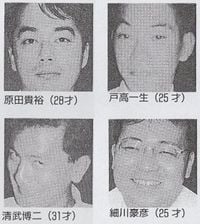
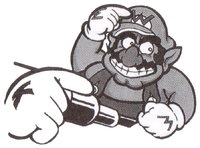
It was Kiyotake's idea to introduce Wario as a new character, with whom he discussed it with the assistant character designer Takehiko Hosokawa, before presenting the idea to the rest of the game's staff. Before Wario's actual character development, his name was the first thing that was decided on. It was derived from the Japanese word "warui", meaning "bad". The idea to have an upside-down "M" on his cap (representing a "W") received immediate, enthusiastic support by the rest of the development staff.[6] Wario's character was based on the idea that a protagonist should have an arch-rival and nemesis. Kiyotake compared Mario and Wario to comic book characters Popeye and Bluto's relationship, where Bluto is larger, stronger, and more cunning than his counterpart, and normally motivated by self-interests. After the idea of Wario was agreed on by the rest of the staff, Kiyotake discussed the details of in-game sprite animation and movement with programmer Takahiro Harada. As well as Wario, there were many other characters which was proposed by Kiyotake. Many of these were either direct rejects, or characters that did not gain approval from the wider staff team.
Kiyotake was very fond of the untouchable Bee Fly enemies used in Tree and Macro Zones, even causing him to "burst out laughing" after he first interacted with them after they were programmed. He was eager to see the Bee Fly remain in the final game, as he was amused by how it would likely annoy players. While developing the controls for the game, Harada considered that players may find it difficult to hold down two buttons on the Game Boy's D-pad to move in a diagonal direction. This was kept in mind while programming how Mario's Bunny and Spacesuit performed high jumps.
Kazumi Totaka, who composed the music for Super Mario Land 2: 6 Golden Coins, acknowledged that the sound effect played when transforming into Super Mario was originally identical to the one used for Super Mario World until about midway through development.[6] However, he was afraid that the player would be given an impression that they are playing a game that overlaps with Super Mario World, and become "negatively conscious" that they were playing on a small Game Boy screen compared to the television screen used by the Super Nintendo Entertainment System. Therefore, Totaka chose to use many different sound effects across other past Super Mario games. Asides from composing, Totaka also had a partial role in some of the discussions between Kiyotake, Harada, and Hosokawa. Totaka was able to provide comments and feedback while proposed ideas were being evaluated. He was also able to come up with suggestions of his own, although these were mostly rejected.[6]
According to Takahiro Harada, the most challenging stage of development was adjusting and fine-tuning the test version after it was presented to playtesters. As he and the team had been playing and testing the gameplay since the beginning, they initially believed that the test version was too easy. However, Harada stated that the testers generally found the game very difficult. About 2-3 months was spent on making small changes to the stages, according to the feedback which they received from the playtesters.[6]
Reception
In GamePro's review of the game, they give the game's fun factor a 5.0/5.0 and praise the game's graphics and control.[7] The publication praises the sound to a lesser extent, giving it only a 4.0/5.0 and calls the music "cute".
| Reviews | |||
|---|---|---|---|
| Release | Reviewer, Publication | Score | Comment |
| Game Boy | Scary Larry, GamePro | 18/20 | "Super Mario Land 2 is the most fun found on the Game Boy in a long time. The game play is not effected by the little screen, and some stages are more challenging than their 8-bit counterparts. Super Mario Land 2 is the kind of game that you'll play again and again. With so many hidden stages and so much awesome action, your battery bill will run as high as the plumber's bill. With everything and the kitchen sink included, this cart makes other Game Boy titles seem like sink sludge." |
| Nintendo 3DS | Corbie Dillard, Nintendo Life | 9/10 | "The original Super Mario Land was a solid start for the series on Nintendo's Game Boy system, but nothing could prepare gamers for what the developers were able to do with this sequel. They managed to improve every aspect of the game and even made the adventure a much longer and more rewarding experience this time around. The difficulty is perhaps a bit on the easy side, but it's still one of the best Game Boy titles ever released and a testament to just how capable a game system the Game Boy truly was, and still is for that matter. If you're a Super Mario fan with a 3DS, you absolutely must take the opportunity to own this game; if you're not, this legendary release is good enough to make you one." |
| Nintendo 3DS | Shane Jury, Cubed3 | 8/10 | "Easily one of the early highlights for the 3DS eShop, Super Mario Land 2: 6 Golden Coins brings a pure platforming experience to handheld owners, together with some unique attributes for the game to call its own. Length and toughness issues aside, Mario's second portable endeavour and Wario's introduction is simply a must play." |
| Aggregators | |||
| Compiler | Platform / Score | ||
| GameRankings | 79.56% | ||
Pre-release and unused content
A pre-release screenshot, as well as a video, showed a different, less detailed title screen in at least one build, featuring a sign more similar to the one from Super Mario Land.[8][dead link]
Early variations of certain graphics exist and may be found within the data of the game. Mario’s front poses in his different forms appear slightly different and thinner, with darker fireballs. Shadows were added to the fonts, while a time font used to indicate time remaining was removed. Pipes were made thicker, likely so that Mario could pass through completely. The goal had no bell and the goal sign was raised all the way up, likely indicating that the goal sign would lower down once Mario completed the level. On the other hand, platforms became thinner, with a cracked variety of platform remaining unused.
Some sprites were completely unused, such as swimming animations and forward-facing poses for Mario as Small Mario and Super Mario in the Space Zone. A trampoline highly reminiscent of one from Super Mario World may also be found.
Additionally, there were multiple changes to the overworld map that did not make the final cut. There is a cloud positioned above the Pumpkin Zone. Despite being fully functional, its code was disabled in the final game. Tiles for the top of Mario's castle are present as well, though are obscured by the darkened cloud in front of the castle. For reasons unknown, some water tiles next to Macro Zone's right chimney were switched around. A piece of the fence surrounding Scenic Course is missing.
Glitches
- Main article: List of Super Mario Land 2: 6 Golden Coins glitches
Out-of-bounds glitch
In area 4 of Tree Zone, the player can lure a Skeleton Bee to the far left part of the stage, then lure it to a greater height, then hold up and jump to do a high jump and bounce off of the Skeleton Bee to reach a normally inaccessible area. The player should then wait for the Skeleton Bee to follow Mario, then go as high as they can to bounce off of the Skeleton Bee again. Mario will go into the wall and slide to the right until he falls out of it, then he will enter an out-of-bounds area that contains glitched tiles (which can crash the game, reset it, or even unlock a stage).
Pipe glitch
This glitch only works for ROM versions v1.0 and v1.1. In any level with a pipe in it, if the player presses and at the same time they leave a stage or enter a pipe and return to that level, they can then move through the floor. If there is nothing underneath the stage, the player can see a number of glitchy tiles. These tiles are actually the entire game's code and Game Boy's code being displayed as graphics.
Staff
- Main article: List of Super Mario Land 2: 6 Golden Coins staff
The music for this game was composed by Kazumi Totaka. If the player waits on the Game Over screen for two minutes and thirty seconds, Totaka's Song will play.
Gallery
- For this subject's image gallery, see Gallery:Super Mario Land 2: 6 Golden Coins.
Media
- For a complete list of media for this subject, see List of Super Mario Land 2: 6 Golden Coins media.
| File info |
| File info |
| File info |
| File info |
| File info |
| File info |
| File info |
| File info |
Names in other languages
| Language | Name | Meaning | Notes |
|---|---|---|---|
| Japanese | スーパーマリオランド2 6つの金貨[?] Sūpā Mario Rando Tsū: Muttsu no Kinka |
Super Mario Land 2: 6 Golden Coins | |
| Chinese (simplified) | 玛利欧世界 第二集[9] Mǎlìōu Shìjiè dì èr jí |
Mario World: Second Episode | |
| Chinese (traditional) | 超級瑪利歐樂園2 六個金幣[?] Chāojí Mǎlìōu Lèyuán 2: Liùgè Jīnbì |
Super Mario Wonderland 2: Six Gold Coins | |
| Korean | 슈퍼 마리오 랜드 2[?] Syupeo Mario Raendeu 2 |
Super Mario Land 2 |
Trivia
- If the player loses a life in a level they have already completed, it is possible to exit the level by pressing
+
(even when the death animation is playing, if done fast enough) without losing any lives.
- On the File Select screen, if the player is deleting a file, Mario will transform into Bomb Mario.
- With Wario as the antagonist, this is the third Super Mario title to feature a major villain that is not Bowser, the first being Super Mario Bros. 2's Wart, and the second being Super Mario Land's Tatanga.
External links
References
- ^ Kazuya Sakai (Ambit), kikai, Akinori Sao, Junko Fukuda, Kunio Takayama, and Ko Nakahara (Shogakukan) (ed.) (2018). Encyclopedia Super Mario Bros.. Milwaulkie: Dark Horse Books (English). ISBN 978-4-09-106569-8.
- ^ Official Japanese artwork for the 30th Anniversary of Super Mario Bros. illustrating the games part of the Super Mario series
- ^ ヒストリー | マリオポータル | Nintendo. Nintendo (Japanese). Retrieved May 31, 2024.
- ^ The official home of Super Mario™ – History. Nintendo of America (American English). Retrieved May 31, 2024.
- ^ 1992. Super Mario Land 2: 6 Golden Coins instruction booklet. Nintendo of America (American English). Page 3-4.
- ^ a b c d e Super Mario Land 2: 6 Golden Coins official Shogakukan game guide. Shmuplations. Page 106-111. Retrieved May 31, 2024.
- ^ February 1993. GamePro issue 43. Page 152-153.
- ^ Source
- ^ File:Chinese MANI GameBoy Box(Side).jpg
| Game Boy games | |
|---|---|
| Super Mario franchise | Alleyway (1989) • Baseball (1989) • Super Mario Land (1989) • Golf (1989) • Dr. Mario (1990) • Super Mario Land 2: 6 Golden Coins (1992) • Donkey Kong (1994) • Mario's Picross (1995) • Picross 2 (1996) |
| Donkey Kong franchise | Donkey Kong (1994) • Donkey Kong Land (1995) • Donkey Kong Land 2 (1996) • Donkey Kong Land III (1997) |
| Yoshi franchise | Yoshi (1991) • Yoshi's Cookie (1992) • Tetris Attack (1996) |
| Wario franchise | Wario Land: Super Mario Land 3 (1994) • Wario Blast: Featuring Bomberman! (1994) • Wario Land II (1998) |
| Miscellaneous | Tetris (1989) • The Legend of Zelda: Link's Awakening (1993) • Game & Watch Gallery (1997) • Game & Watch Gallery 2 (1997) |
